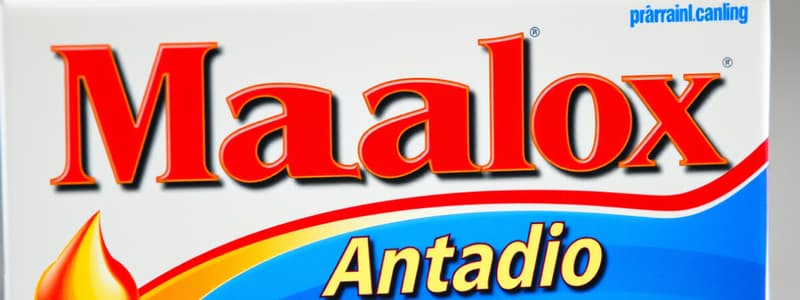Podcast
Questions and Answers
What is the drug group of Maalox?
What is the drug group of Maalox?
- Antacids (correct)
- Analgesics
- Antivirals
- Antibiotics
What are the main ingredients in Maalox?
What are the main ingredients in Maalox?
Aluminium hydroxide Al(OH)3 and magnesium hydroxide Mg(OH)2
What is the legal classification of Maalox?
What is the legal classification of Maalox?
GSL
What is the pharmaceutical formulation of Maalox?
What is the pharmaceutical formulation of Maalox?
What conditions is Maalox used to treat?
What conditions is Maalox used to treat?
How does Maalox work?
How does Maalox work?
What is the usual adult dose of Maalox?
What is the usual adult dose of Maalox?
What symptoms indicate that Maalox is working?
What symptoms indicate that Maalox is working?
What are some important side effects of Maalox?
What are some important side effects of Maalox?
What should be monitored to check for side effects of Maalox?
What should be monitored to check for side effects of Maalox?
What are the important drug interactions with Maalox?
What are the important drug interactions with Maalox?
What important information should patients receive regarding Maalox?
What important information should patients receive regarding Maalox?
Flashcards are hidden until you start studying
Study Notes
Drug Overview
- Maalox belongs to the antacid drug group, commonly used to neutralize stomach acid.
Composition
- Active ingredients include Aluminium hydroxide (Al(OH)3) and Magnesium hydroxide (Mg(OH)2).
Legal Status
- Classified as General Sale List (GSL), meaning it can be sold without a prescription.
Formulation Type
- Available in oral suspension form, facilitating ease of administration.
Indications for Use
- Primarily indicated for treating dyspepsia; usage is not recommended for individuals under 14 years.
- May also be utilized to alleviate constipation.
Mechanism of Action
- Neutralizes stomach acid by hydroxide ions reacting with hydrogen ions from parietal cells, forming magnesium and water.
- Increases pH, inhibiting pepsin action; may have cytoprotective effects through enhanced bicarbonate and prostaglandins.
- Acts as a laxative by drawing water into the intestines, softening stools, and increasing fecal volume.
Dosage Guidelines
- Recommended adult dose is 10-20 ml, taken 20-60 minutes after meals or at bedtime, as needed.
Effectiveness Monitoring
- Relief of symptoms such as retrosternal pain, acid reflux, and flatulence indicates efficacy; if symptoms persist, refer to a GP for further assessment.
Common Side Effects
- Possible side effects include diarrhea, constipation, and electrolyte imbalances.
Side Effect Monitoring
- Monitor for elevated blood pressure due to salt formation; halt treatment and seek advice from a pharmacist or GP if severe diarrhea occurs.
Drug Interactions
- Aluminium hydroxide may reduce absorption of chenodeoxycholic acid and iron chelators.
- Magnesium hydroxide can decrease the absorption of clodronate and risedronate.
Patient Information
- Do not administer to children under 14 years.
- Advise patients with high blood pressure to consult a doctor.
- For those taking chenodeoxycholic acid, separate dosing by 5 hours to avoid interaction.
Studying That Suits You
Use AI to generate personalized quizzes and flashcards to suit your learning preferences.
